Our apologies, Cavs. Due to the weather we won’t be able to publish Issue 11 until Monday, March 4, but look for it on newsstands then!
-Mackenzie Clark, editor-in-chief, mclark68@jccc.edu
Our apologies, Cavs. Due to the weather we won’t be able to publish Issue 11 until Monday, March 4, but look for it on newsstands then!
-Mackenzie Clark, editor-in-chief, mclark68@jccc.edu
In its 200th anniversary, this classic book-turned-movie is still perfect
By Gabrielle Fitzgerald
Oh, February: the month when all the adorable couples pull out every romantic movie ever made and all the single people go to their respective corners to play Xbox or eat chocolate. Surprisingly enough, there is a movie that all of these people should watch and enjoy: “Pride and Prejudice.”
Now, before the single men go running back to the safety of “Dead Space 3” (yes, I know, it’s brand new!), let me just say that if you want a date with a human woman this Valentine’s, inviting that hot chick over for an evening of “Pride and Prejudice” is a sure way to go.
For all you single women crying and eating chocolate in your pajamas, a little bit of Mr. Darcy will brighten your world. And, naturally, for all the couples, this movie is a must.
For those who don’t know the story at all (I’m looking at you, poor, uncultured men), here’s your cheat sheet, so you can impress the lady love of your life.
Elizabeth Bennet lives with an overbearing mother, an absent-minded father and four sisters in early 19th century England. Jane, the eldest, is the prettiest and Lydia, the youngest, is silly and flirty. The other two are irrelevant. The wealthy, single Mr. Bingley moves to town with his sister and his friend Mr. Darcy, who is even richer and also single. Jane and Mr. Bingley hit it off, while Elizabeth and Mr. Darcy can’t stand each other.
The book/movie proceeds from there with all the twists, comedy and passion of an endearing romantic tale, complete with Kitty’s scandalous elopement and the arrival of the Bennet family’s creepy cousin.
With that plot, you should promptly be heading to the college library to rent the movie, but once there, you discover there are multiple versions. What do you do when your girlfriend asks which your favorite is, your crush asks which version you rented, or you really just want to ogle over the most attractive Darcy? Don’t worry. Here’s the breakdown so you can impress all your peeps and get the best “Pride and Prejudice” experience.
The first version, directed by Robert Z. Leonard, was made in 1940. You can expect the voluptuous-figured women of the ‘40s complete with pin-curled hair, ridiculously fake eyelashes and sultry voices. Their gowns are poufy, covered in bows, and show the least amount of skin possible, looking suspiciously like characters from “Gone with the Wind.” Mr. Darcy, portrayed by Laurence Olivier, isn’t horrible looking, but honestly, it’s hard to drool over a man who died 24 years ago. The screenplay was written by Aldous Huxley, author of the classic Brave New World, so you can expect scenes to be changed or completely altered compared to the later versions.
Welcome to 1980. Yes, unfortunately, even Elizabeth Bennet couldn’t escape the frizzy pomp of bangs the ‘80s heralded with pride. While the plot is accurate and fun to watch unfold, especially with Mr. Darcy’s manly jaw and dark pools of eyes, it is really difficult to fall in love with this six-hour long movie. This may be one to leave to those viewers who loved the ‘80s because otherwise, I think the hair on the Bennet girls’ heads should stay hidden in the past.
The most timeless is the 1995 Colin Firth version. Naturally, ladies, who doesn’t love Firth as Mr. Darcy? The biggest problem I have with this film is in order to enjoy the magnificence of this movie, I have to spend 300 minutes of my life on it. The plot is thorough, to say the least, and it contains the famous “Darcy in the water” scene.
This is that movie, boys. If you’ve seen it or suggest it, the ladies will love you. It’s a classic and it gives you plenty of time with the love of your life. If I had the time, this is the version that I would always choose, and I think many women would agree.
Lastly, there is the 2005 version starring Keira Knightley. I love this version because of the attractiveness or star quality of all the actors: Knightley, Matthew MacFadyen, Donald Sutherland and Rosamund Pike to name a few. This movie is a doable two hours, but with that short amount of time, much of the plot is lost.
More problematic than that is director Joe Wright’s apparent fascination with filling up the movie with artistic shots of Elizabeth Bennet on a tire swing, on a cliff, or staring in a mirror. The first time it’s charming, but for girls like me who watch this movie about once a month, I just want to punch Wright for wasting my time. But for all the single boys out there, if the date with your crush doesn’t work out, at least you got to spend your night watching Knightley.
So, with that, I leave you to go find your perfect “Pride and Prejudice,” because “nobody don’t like ‘Pride and Prejudice’!”
Contact Gabrielle Fitzgerald, features editor, at gfitzge1@jccc.edu.
By Jon Parton
On a Sunday morning, the homeless and the needy stood in line for a warm meal at the Wilhelmina Gill Center in Kansas City, Kan. An elderly woman dressed in a dirty oversized jean jacket bared a toothless smile as she stood in line.
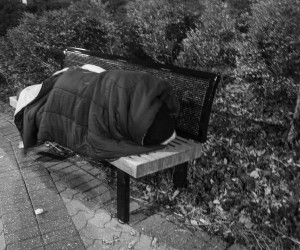
“God is good,” she said. “God is good.”
The woman did not have long to wait, as the people in front of her ushered her ahead in line. An unwritten rule says that the youngest and oldest are first to be served. According to James Harrison, one of the homeless visiting the center, poverty means looking out for one another.
Harrison, 33, said he has been living on and off the streets since high school.
“When I first came here from Manhattan, I kind of had a place to stay with my uncle,” he said. “But everybody wants money. And if you ain’t got no money, it takes a long time to make some money and find a job.”
The center is one of many attending to Kansas City’s local homeless population. In Johnson County alone, the public school districts reported more than 1,100 students classified as homeless last year. That number represents 13 percent of all homeless youths in the state of Kansas.
According to David Burch, volunteer at the Wilhelmina Gill Center, demand has been on the rise since he first started four years ago.
“We’re open seven days a week,” Burch said. “We always have people coming in.”
 The center also offers hygiene products, free health screenings and a survival skills workshop for women. In addition, the center offers short-term monetary assistance and even mediation programs for families facing eviction and utility termination notices.
The center also offers hygiene products, free health screenings and a survival skills workshop for women. In addition, the center offers short-term monetary assistance and even mediation programs for families facing eviction and utility termination notices.
Burch said the center helps provide more than just food to the local homeless.
“We set up a voicemail system for people without phones so they can list a phone number on a job application,” Burch said. “We provide people an address or P.O. box so they have a place where they can pick up their food stamps.”
Leo Easterwood is a former police officer with the KCK Police Department. He was assigned to the center as part of his beat but continued to provide security after his retirement. While sitting to talk, Easterwood was greeted by a few visitors.
“I’ve been here about 15 years,” Easterwood said. “I’m the kind of person who is, if I’m given a job, then I’ll stay there and stick with it until something else happens. And I guess you might say I’ve been here so long, I’ve got a rapport with the people.”
Easterwood said his ongoing presence provides a sense of stability for visitors to the center.
“A lot of these people have mental problems,” Easterwood said. “Whether it’s from alcohol, drugs or a combination of mental challenges and they don’t know how to react in any given case to any given thing. So it has to be someone who can kind of, you know, bring them to themselves and let them understand that everyone’s not their enemy.”
Although the number of homeless visiting the center has increased in recent years, Easterwood said he has seen a lot of people move forward with their lives.
“We’ve had people come in here who literally have nothing,” Easterwood said. “Shirts on their backs. But they had enough about them that they wanted to do more. I’ve known people that leave here and come back just to see the people and help.”
Easterwood said aside from mental health problems, drugs have also played a role in the current homeless situation in Kansas City.
“A lot of people who come here, we’ve had ex-police officers who lost their job because of drugs,” Easterwood said. “We’ve had probation officers who lost their job because of drugs. We’ve had a number of people with multiple degrees lost their jobs because of drugs.”
Harrison said drugs are a daily routine among a lot of homeless.
“It’s the lifestyle, so to speak,” Harrison said. “Now yes, I do indulge in drug activity. I sell it, smoke it, sniff it, whatever it is. It’s around me everyday. In a sense, I guess you could say I’m an addict. Consuming it with a certain person, just even interacting with somebody can get you a benefit. It’s just building rapport. Drugs aren’t the best thing to be doing, but I do.”
Harrison said his addiction began before he was born, as his mother took various drugs while she was pregnant with him. Harrison pointed to his mother, standing no more than twenty feet away carrying a tray of food.
“My mom’s been smoking since before I was born,” Harrison said. “She doesn’t like anything but that. She’ll run down anybody to get it now. It’s consumed her soul.”
Contact Jon Parton, managing editor, at jparton@jccc.edu.
By Stephen Cook
When Caniggia Raynor says that his friends and teammates are like family, he means it in a way that many athletes can’t relate to. Most of Raynor’s family lives more than 1,800 miles away on the island of Jamaica.
Click images below for gallery view
Raynor, sophomore track athlete, grew up in Greater Portmore, Jamaica and first started throwing discus when he was 16. After he graduated he was looking for offers to throw for a post-secondary institution, but didn’t receive any that were suitable. Eventually head track coach Phil Groves asked him to throw for JCCC.
Now Raynor is nationally ranked, currently holding first place in the NJCCA indoor weight throw. Before coming to the college, Raynor had never even thrown the hammer or weight before.
“I think Caniggia’s biggest success is just he committed wholeheartedly to achieving excellence,” Groves said.
Groves, who works with Raynor, said that he has been recruiting international athletes as long as he’s been a coach. He first heard about Raynor from an athlete he coached while at UMKC.
Raynor came to the college two years ago, in the fall of 2011. He said that although his first semester was rough, the second was better and this year has been fantastic. His friends and prayer have helped him stay encouraged.
“The main thing is, I always have this urge, always trying to be successful in anything I do,” Raynor said. “I think this college experience, where I’m in right now, [has] kind of given me a better view of life.”
In addition to his persistence, Groves believes Raynor’s personal and international background makes him push a little harder.
“Let’s just say, a typical American athlete: you come here, you flunk out or whatever it may be, you don’t do well and you end […] at home living in Mom and Dad’s basement,” Groves said. “A lot of times these international guys, they have a little bit more to lose, and so they’re willing to really commit and work a little bit harder.”
After nationally qualifying for indoor shot and weight, Raynor said he received an offer to throw for another school, but decided to stay at the college for a second year.
Hayes Grissom, who throws javelin for the college, has known Raynor for two years, but he says it was this year that he has really become good friends with him. Grissom described Raynor as being “distinctly Caniggia”.
“He walks all loud and proud, he walks with his chest all puffed out and he’s proud of who he is and the way he talks to people, you can tell,” Grissom said. “It’s not that he thinks he’s better than them, but he’s just really confident with himself.”
Grissom said he sees Raynor as his other half. Since Grissom throws javelin and Raynor throws shot put, discus and hammer, the two of them have all of the throwing events covered. Grissom, who was national runner-up in javelin, said he keeps encouraging Raynor to do well so that their track team can be national champions in all of the throwing events.
This season at an indoor track meet, Raynor scored 19.11 meters in the weight throw. According to Raynor, that throw has opened a lot of doors. Additionally, he recently broke both a fieldhouse and a school record in the event.
Looking towards the future, Raynor has his expectations set high.
“My main goal, to be honest, is trying to get that Senior Olympic Games or a world championship,” Raynor said. “I really wish to be one of those things one of these days.”
Contact Stephen Cook, copy editor, at scook35@jccc.edu.
By David Hurtado
As the crisp morning air and frost-coated windows begin to withdraw, sporting events for the spring semester are kicking into gear. The men’s and women’s track teams, who opened their 2013 season in January, are off to a promising start.

Sophomore thrower Caniggia Raynor set a new school record at 62-8.5 in the weight throw on Jan. 25 at the Fieldhouse. The same day, during the Cavalier Night Relays, sophomore Monet Jackson broke the women’s record in the same event, finishing at 56-1.75.
Phil Groves, assistant coach, track and field, said he attributes the success of the student athletes toward hard work and determination.
“Our desire to work hard and get better every day, that’s spread throughout the team,” Groves said. “We’ve got some really good leaders in our sophomores, and they’ve helped mentor our younger kids along. We try wholeheartedly toward achieving excellence. That’s our motto.”
Groves added the team has quite a few new faces this season, including new javelin throwers and jumpers.
Last year, the Lady Cavaliers finished up the season taking fifth place overall at the NJCAA Outdoor Championships at South Plains College in Levelland, Texas. The men’s team completed the season with 12th place overall.
Mike Bloemker, head coach, track and field, said replicating the same success the teams saw last season is a top priority.
“We would like to repeat as regent champs,” Bloemker said. “That would be the first goal.”
Groves said one of the major challenges the teams faced prior to the start of the season was the difficulty of training in an indoor facility.
“Having our facility resurfaced over the winter break and not being able to train inside, that was a bit of a challenge,” he said. “Just dealing with some weather issues and practice restrictions, but that’s a challenge that every school faces. We’ve managed to deal with it.”
As for the competition, Groves said both teams have faced a healthy dose of it.
“Competition’s been good,” he said. “Our region is pretty deep, there are quite a few good schools in the Kansas area and nationwide. We’ve seen a lot of good competition from Division I and Division II schools that we compete against as well.”
Groves went on to say the camaraderie amongst the student athletes is strong.
“Team chemistry is awesome,” he said. “I don’t have to worry about doing running lists; we can just put them together with whoever. Everybody gets along very well. I think it really helps the team overall.”
Kurt Vukas, sophomore, said he runs the 800m and 1500m and feels like the season has gone pretty well for him so far. He said he feels like much of his hard work is beginning to pay off, but acknowledged he could still improve.
“It’s about seeing how far your body can go; pushing it and seeing where your limits are at,” Vukas said. “Then you push past those limits and find them again.”
Contact David Hurtado, staff reporter, at dhurtado@jccc.edu.

By Mac Moore
Sameia Kendall is a freshman women’s basketball player from Raytown High School in Kansas City. Currently she averages around nine points per game and is tied for second most steals in the season.

Q: What is the team primary focus at this point in the season?
A: The primary focus at this point, which it’s been all year, is to get better every day and everything else will work out on its own. We live by the model “process over product”.
Q: How’s it been tough to stay grounded while playing at this high level? What things do players and coaches do to keep the team striving for improvement during a fairly dominant stretch of games?
A: Playing at this high level has definitely been a change for me, comparing to high school basketball. It’s a bigger commitment and the dedication has to be there to stay grounded. During long stretches of games, to keep improving, we just take one day at a time and focus on improving day by day.
Q: Last year’s team finished with a 32-3 record, but a 1-2 tournament record. Do you believe this squad will be able to match or succeed the performance of last year’s squad?
A: Last year’s team was very good and I think we look up to them. Hearing about their accomplishments from Coach [Ben] Conrad pushes us to strive to try to accomplish things that they were able to accomplish. We don’t see this as a competition, but more as an honor to be mentioned in the same group as last year’s team.
Q: What has been the memorable moment of this season for you?
A: The most memorable moment was getting revenge on Highland after they beat us at their place. I think the loss was more memorable though because I think it was humbling. It was our first loss of the season and it put a chip on our shoulder that we needed to get better and we had not accomplished anything yet.
Q: Favorite movie?
A: “Love & Basketball”
Q: Favorite artist?
A: Beyoncé
Q: If you were given $50,000, but half had to go to charity, what charity would you give it to and what would you do with the rest?
A: St. Joseph children cancer patients. Then I would give some to my parents, pay for the rest of my schooling, of course spend some on me, and put the rest in the bank.
Contact Mac Moore, sports editor, at mmoore82@jccc.edu.
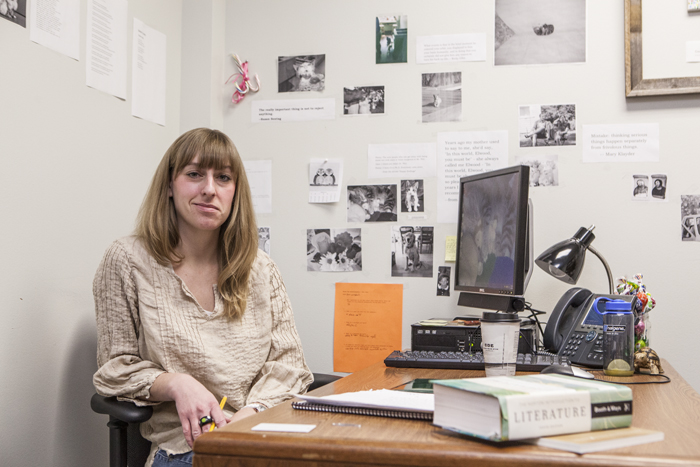
By Gabrielle Fitzgerald
From a former dance student to the adviser of the college’s creative writing club, Sam Bell is anything but a stereotypical English professor.
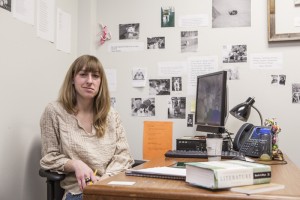
Born in Fairport, New York, Bell was the child who could usually be found either writing or dancing. Although she wanted to study ballet, Bell explained she was too short to ever become a professional.
“I started out in ballet, and that sort of transferred into creative stuff, so then I started writing and reading poetry,” Bell said.
After receiving her undergraduate degree in journalism, Bell worked features section in her school newspaper and took a large number of creative writing classes.
“I just loved writing,” Bell said. “I was doing a lot of feature writing, which was more like essay writing. [..] so that’s basically how I got into creative writing and went into a master’s program. That’s where I started figuring out what I really wanted to do, particularly creative non-fiction.”
Three years ago, after receiving her doctorate degree in English, with an emphasis in creative writing from the University of Kansas, Bell became a full time faculty member at the college.
“I met Sam through our departmental meetings, and I really gravitated toward her because when she would speak or share things about her practice, I had a great deal of connection with what she taught and her thoughts about students,” said Amy Pace, adjunct professor of English.
Although Bell loved her students, she said she came to see them even more as people versus students after a tragedy in one of her classes this past fall.
“There was a sudden and unexpected death… [This] student and his friend were very funny together…to a point that it sort of helped unify the class,” Bell said. “To that end, the loss was pretty monumental because he was someone who always contributed to the class discussion.”
Because of this, Bell said she will write letters to each student at the end of the semester. The advice came from her husband and is a way she can tell students how important they are as a person, regardless of their grade in her class.
“It was really great that she took the initiative to just seek help and be able to kind of talk out what happened,” Pace said. “I think it really speaks a great deal about how much Sam cares about her students… I thought it was great that she spoke very candidly about what she was thinking and experiencing and the best way to kind of meet the needs of her students who were kind of feeling the same way.”
Danny Alexander, professor of English, described Bell as a “very emphatic leader.”
“She’s very sensitive to and aware of her students, gives a lot of thought to them and is always trying to discern how to make her class work better for everyone,” he said. “She’s a really powerful person.”
Bell also founded the college’s creative writing club, an idea brought to her by some of her students who wanted to keep writing after the semester ended but needed the pressure of classroom deadlines to accomplish it. The club meets for writing workshops as well as monthly readings of students’ work.
“Sam had the vision that [the creative writing club] could happen and started doing it, without any precedent and it’s really worked well,” Alexander said. “Sam brings all kinds of energy and new ideas to the department…The ability to bring people together in a way that actually feels very real to them and for everyone that attends is very meaningful. It’s a special kind of person that is sensitive to what people need in order to make that really work. She’s done it. As far as I’m concerned, she’s a star in the program and we’re really really lucky to have her: students, teachers, everybody.”
Contact Gabrielle Fitzgerald, features editor, at gfitzge1@jccc.edu.

By Hannah Davis

The Hospitality and Culinary Academy, currently under construction, will have rooms named on behalf of four private donors.
“In this case, these four groups gave more than $200,000,” said Joe Sopcich, executive vice president of administrative service – CFO. “So, for $200,000, a room would be named in their honor.”
The Ball family and the Regnier family each donated $200,000; Maron Moore donated $500,000 and the Wysong family donated $750,000.
Originally, Senator David Wysong donated the $750,000 to the program seven years ago.
“David gave me $750,000 and asked me to elevate the culinary program,” Lindy Robinson, dean, Business, said. “David never really wanted bricks and mortar to speak of, but I had put together several new initiatives to elevate the program without using any of the money he had given me, and convinced him what this program really needed was a new building.”
From there, Sopcich and Robinson had the task of raising $3 million in 24 months for the Board of Trustees to approve and provide the remaining funding for the new building.
“[Sopcich] and I worked together and we actually raised $3.2 million in 18 months,” Robinson said, “so we went back to the Board of Trustees […] and they committed $13 million for a 36,000 square foot, free-standing culinary academy. There was a lot of work to go out and raise that money, but we did it.”
The Wysong Family Culinary Theatre, which will be used as a classroom, will also allow for guest chefs to come in for demonstrations and broadcasts. It will hold 76 people, but the back of the theatre will open up as an overflow, which will allow for more space.
“It’s a nice linkage between the actual naming,” Sopcich said. “You know the Culinary Theatre is there to broadcast and get the word out, and that’s what David Wysong was interested in—in elevating the program, so it makes a lot of sense.”
The Regnier Family Dining Room will also be used as a classroom, but it will be designed as a front-of-house restaurant to give students a more applicable, realistic learning experience. It will also hold the program’s Thursday luncheons.
The Maron J. Moore Hospitality Library will be a resource and study center full of cookbooks for culinary students.
The Ball Family Garde Manger Culinary Lab will be a stainless steel kitchen to learn the art of cold food production.
Both the Sunderland and Polsky families met the monetary threshold in donations but were not considered for naming rights. According to Sopcich, the Sunderlands were “just not interested in naming.” The Polskys were not considered because they already have naming rights for the Polsky Theatre, located in the Carlsen Center.
Many others donated to the program, including the hospitality program’s faculty, alumni, and several non-profit organizations, such as the Greater Kansas City Chef’s Association, the Greater Kansas City Hotel and Lodging Association and the Greater Kansas City Restaurant’s Association. Robinson noted the expansion of the hospitality program is “an investment for the industry.”
“We think it’s just going to get bigger and better, and also provide new opportunities for students to use the facility and for members of the community as well,” Sopcich said.
Wysong donated to the program in hopes that “it will become one of the best culinary schools in the country, if not the best,” he said.
“[The culinary program is] always in the newspaper,” Sopcich said. “It brings a lot of recognition to the school. It’s just a great program.”
The Jerry Vincent Hospitality Suite, located on the first floor of the OCB, will be cleared out once the new academy opens in the fall. According to both Sopcich and Robinson, no decisions have been made as to how that space will be utilized.
Contact Hannah Davis, news editor, at hdavis18@jccc.edu.
By Mac Moore
A few years ago, my roommate was really excited about Valentine’s Day. The evening had been planned for weeks. He was going to cook her pasta with alfredo sauce, homemade breadsticks, fresh salad, the works. When V-Day arrived I saw that my friend grew in anxiousness throughout the day. At heart I am a hopeless romantic, so seeing my little buddy get so worked up tickled my heart strings. I hoped the best for him.
The best did not happen. Turns out he had never made an alfredo sauce before. It gave him trouble. Then he burned it. “Scorched” might be a more accurate term. The alfredo was a no go. He went to the store to get a premade sauce that would cook quickly and get him back on track. This time I watched over it to make sure there would not be another folly to ruin his night. He set the table for her arrival. With the food prepared he was a tiny bit settled, yet the wait always brings the anxiety back.
He waited 15 minutes for her to show up. The anxiety rose. She was supposed to arrive in 5 minutes. The anxiety rose. It was finally time. The anxiety rose. He wanted to call to see how close she is but he felt that would just be annoying. The anxiety rose. She is 5 minutes late. He prepared a text but decided not to send it. He did not want to seem clingy or desperate. The anxiety rose. He called because she is 20 minutes late. No answer. The anxiety rose. This continued until she was an hour and a half late.
My depressed little friend and I ate the cold food. The anxiety died. Finally she called and said she passed out. It was late so she told him she would see him tomorrow, no point in coming over. She broke up with him two days later. That night my depressed buddy and I went out to the bar hoping to find him someone new.
No, I will not misogynistically say this happened because women are emotional terrorists. I will not say that despite quivering at the sappy fake romance depicted by that Nicholas Sparks drivel, women, in reality, are vicious vixens with black hearts. I will not let the truth to these descriptions interfere with my objectivity. We have to face it: men and women alike participate in games of the heart only to treat it like warfare. And let’s stop pretending it is because we have to find a “nice one.” We have all at one time or another been the stomper and the stompee in a relationship. This isn’t something that is dependent upon the quality of our character.
It is because of the complexity of relationships. We go after people who we are attracted to. Sometimes they happen to be nice and sometimes they don’t. The person must excite us, entertain us, all while they retain that initial attraction. It is harder than hell to actually find that person. We do not like to be alone, so we settle for what is in front of us and usually that leads to the eventual reality, the breakup. The breakup crushes at least one individual, but it must happen. Most people have been on both ends of this.
The short term rewards of having another person willing and able to provide us with intimate, emotional and sometimes even an intellectual connection blind us to the hell we go through to achieve it. This isn’t saying being single is the solution or the greatest thing on the planet but being single on the 14th of February definitely is not the worst thing in the world.
Contact Mac Moore, sports editor, at mmoore82@jccc.edu.

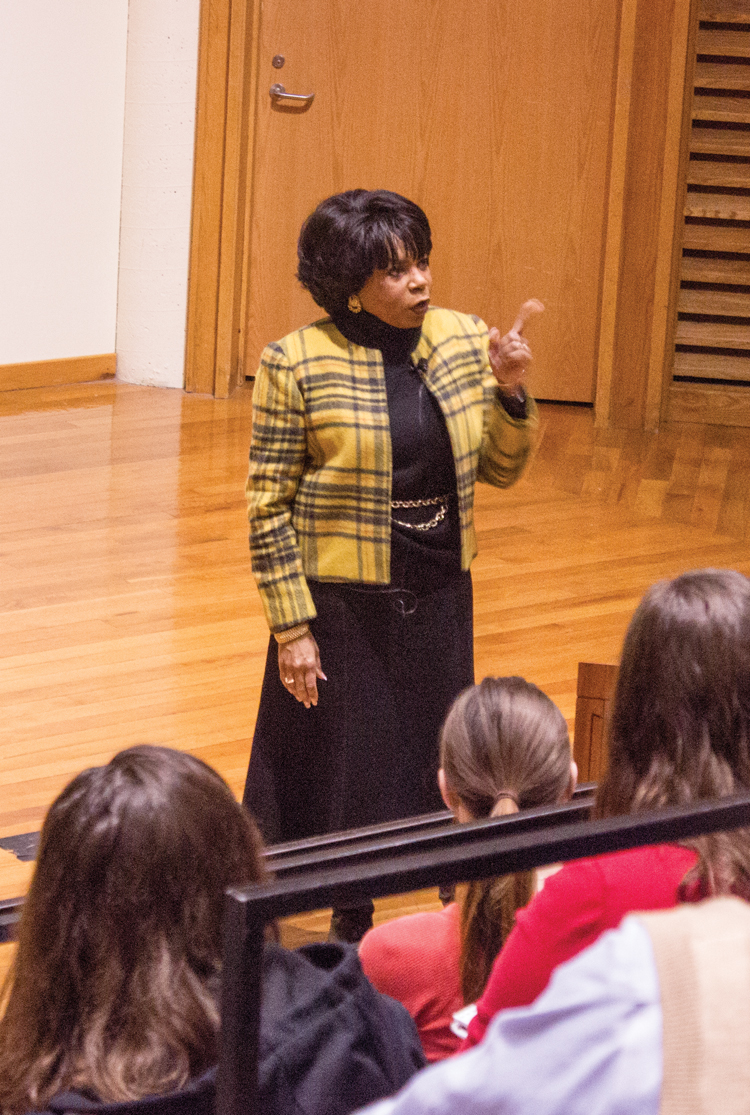
By Hannah Davis
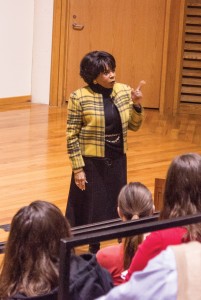
Cheryl Brown Henderson, daughter of the lead plaintiff, Rev. Oliver Brown, in Brown v. Board of Education of Topeka and founder of the Brown Foundation, gave two lectures at the college on Feb. 12 and Feb. 13.
“Her evening presentation is part of the Kansas Lecture Series, which annually hosts an event by a noted Kansan or someone whose work is relevant for Kansas issues,” James Leiker, director, Kansas Studies Institute said. “Since the Brown case of 1954 had such a large national impact, having emerged from the work of an active African American community in Topeka as well as others from around the country, her content merits attention both by those interested in Kansas history and in Black History.”
Her first lecture, “Brown v. Board of Education – Voices of the Legacy” was held on Feb. 12 at 11 a.m. in the Craig Community Auditorium, and her second lecture, “The Judicial Past of Kansas – Giving Meaning to the 14th Amendment” was held the following day at 7 p.m. in the Hudson Auditorium of the Nerman Museum of Contemporary Art. The presentations addressed the legal activism of the African-American attorneys, the intended and unintended consequences of the Supreme Court’s decision, the relevance of Kansas history to civil rights and the myths surrounding the landmark case.
“I learned how the history books from elementary school made [Brown v. Board] sound, but that’s not what the story was like,” Austin Mora, student, said in response to the first lecture. “I thought it was interesting. It’s our recent history and puts Kansas on the map of history.”
Brown Henderson acknowledged that the case, though primarily about segregation in schools, was part of a larger movement.
“Public school was the battle ground, but society was the target,” Brown Henderson said.
Brown Henderson stressed the hierarchy that was embedded in the roots of this country, citing the U.S. Constitution, in which it apportioned Native Americans as three fifths of persons, the Supreme Court decision in Dred Scott v. Sanford, which denied citizenship to black persons, and Plessy v. Ferguson, which established the “separate but equal” doctrine.
“I think Brown v. Board was, in fact, the case that gave the Supreme Court the opportunity to interpret the 14th amendment,” Brown Henderson said. “It impacts our lives because it made it clear, we have sovereign rights.”
These rights, including those protected in the 14th amendment, are still being defined by the courts today.
“We are still debating the meaning of the 14th amendment as to what ‘full, equal citizenship right’ actually means,” Leiker said. “Does it mean the right to a living wage? To health care? To safety and security? It’s the foundation for many discussions today about what ‘rights’ we as American, and human beings, have.”
Brown Henderson hopes that the decision of Brown v. Board and the definition of the 14th amendment will continue to lead to progress in tolerance and equality.
“As human organisms, we are absolutely the same,” Brown Henderson said. “We really need to grow up and realize we all want the same things. We all want to enjoy the lives that we have.”
Contact Hannah Davis, news editor, at hdavis18@jccc.edu.
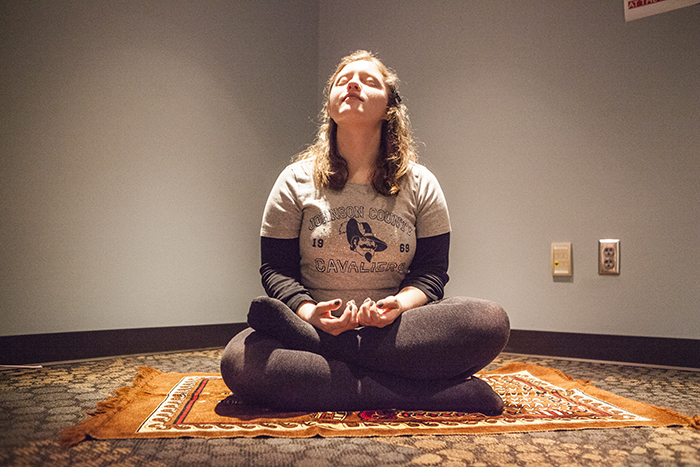
By Hannah Davis
The Meditation Room, located in COM 309, has gained popularity since it opened in the fall of 2010.
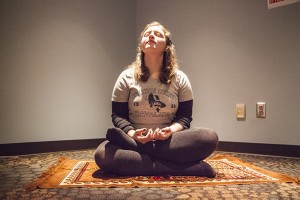
“It’s the third year we’ve had it here on campus,” said Mindy Kinnaman, manager of Student Life and Leadership Development. “Every semester we have more and more people using it. This semester it really has gone up in terms of people who are using it and so we’re just hopeful more and more people do.”
The room was developed after Christian and Muslim students consistently asked for private spaces to pray.
“We had, for many, many years prior to [the meditation room], the request from students for space, a room, whether it be a classroom or an office or a conference room, from our Christian groups to find a place to pray, and from our Muslim students for a place to pray,” said Pam Vassar, assistant dean, Student Life. “And in both cases, those groups would request multiple times a day, sometimes multiple days during the week […] it just made it really hard and most of the time we were not able to accommodate people’s requests.”
This left many individuals and groups praying in the hallways. At this same time, remodeling on the third floor of the COM building was taking place. The Meditation Room was originally pegged as a storage closet.
“At some point we said, ‘Wait a minute, maybe we could utilize that space,’” Vassar said. “It’s not large, but it’s certainly much more private.”
Vassar began research, and discovered the idea of a meditation room.
“We started getting requests from students also, we had the request for prayer, then space for meditation, space for students to just have a place to go, for lack of a better word, for downtime,” Vassar said.
They changed plans during construction and painted the room a light blue color. It has two light settings: one for bright light and one for dim light. Each wall is labeled directionally for Muslim students who must pray toward the direction of Mecca.
“[The Meditation Room] is not directed toward any one person,” Kinnaman said. “It’s open to everyone, so if somebody wants to come in and just have a quiet space to sit for a little bit, if somebody wants to actually meditate, if somebody wants to pray, it doesn’t matter what it is, they’re welcome to use this space.”
The Mediation Room is open from 8 a.m. – 6 p.m. Monday through Thursday and 8 a.m. – 5 p.m. Friday.
Contact Hannah Davis, news editor, at hdavis18@jccc.edu.
By Stephen Cook
Google employees were at the college during the last week of January gathering information for new indoor maps. They will compile that data with floor plans to create interactive maps used to navigate campus.
“One of the things that we try to do is receive feedback from students, community members, employees on how we can improve,” said Sandra Warner, Deputy CIO/director, Administrative Computing Services, who headed up the project. “One of the challenges that the college has been facing for some time is way finding.”
In order to map out the area, Warner said the employees had to walk down the middle of the halls while their positions were tracked, essentially becoming the blue dots.
No cameras or large, special equipment was used in the process. Warner said the Google employees ultimately used their smartphones to do this.
The Google website provides more specifics about how people will be able to use this technology within the existing Google Maps application:
“Indoor floor plans are seamlessly integrated into Google Maps for desktop and Android and are automatically enabled when the user zooms in, and fade away when the map is zoomed out,” Google stated on its website.
Judi Reilly, advertising coordinator for the college, was in charge of overseeing that the floor plans were updated and developed for submission to Google. About 50 floor plans were sent in for the main buildings on campus, with each floor requiring its own plan.
Reilly says although it took a while to go through and update the Computer-Aided Design files, the process went smoothly.
“What we wanted to do was make sure we did our due diligence in terms of checking things out in terms of our design,” Reilly said. “What we wanted it to accomplish, what we didn’t want it to do, we kind of looked both ways.”
Although some have voiced concern regarding security and safety issues, Warner said room numbers will be displayed for classrooms and offices, instead of saying something like “Sandra Warner’s office.”
“The negotiation process we went through with Google was that we would retain control over what would actually get published out in those maps,” Warner said
Although there is no definite timeline, Warner said Google is currently combining the position data and the floor plans. According to Warner, the maps should be posted and available for use in the near future.
Google offered the services to the college, and there was no cost associated with the process.
With this technology, Warner said the college is looking forward to being able to provide a better experience for students and guests.
“It’s that whole challenge of […] trying to find ways to break down any barriers to people coming in, enjoying what JCCC has to offer,” Warner said. “However it is that we’re involved in helping people achieve their goals, we want to be able to do that.”
Contact Stephen Cook, copy editor, at scook35@jccc.edu.
Board discusses budget in retreat
The Board of Trustees met for a special retreat on Monday, Feb. 11 to discuss budget projections over the next several years.
Don Perkins, associate vice president, Financial Services, presented four possible budget plans for the trustees and administration to consider, although options are not limited to those four.
The Ledger will cover the decisions the Board makes at its regular monthly meeting on Thursday, Feb. 21. Follow @CampusLedger on Twitter for up-to-the-minute information.
College partners with National American University
National American University and JCCC have joined forces to offer doctorate-level classes on campus.
This “Community College Leadership Program” is designed for faculty who wish to pursue an educational doctorate degree. Details will follow in Issue 11 of The Campus Ledger, printing Thursday, Feb. 28.
College to host naturalization ceremony
Approximately 90 individuals representing about 40 countries will be naturalized in a formal ceremony held at 1:30 p.m. Friday, Feb. 22 in the Polsky Theatre.
Judge James P. O’Hara will preside over the court proceeding, which will also be live-streamed in the Craig Community Auditorium (GEB 233).
The public is invited to attend. The event is part of the Democracy Commitment.
Compiled by Mackenzie Clark, mclark68@jccc.edu
By David Hurtado
The year is 476 A.D., and the Western Roman Empire has collapsed beneath the barbarian hordes. Rome, which once stood as the apex of glory in the known world, has been extinguished.
But Rome was not the first great empire to come to an end, nor will it be the last. From the Macedonian Empire to the Han Dynasty, no civilization has withstood the test of time. Each great empire, no matter its power and accomplishments, was ultimately buried under the sands of time.
All throughout history, each empire has been built upon the same foundation; force. And as the saying goes, “those who live by the sword, die by the sword.” The United States on the other hand, is a different kind of empire, if it can be considered an empire at all. We are an empire of ideals.
This country was founded upon the idea that each and every individual is endowed with the right to life, liberty and the pursuit of happiness. Not because of God or words printed on paper, but because we are human beings. Sadly, the beliefs and values which Americans once guarded so closely have become undone.
More than two centuries ago, Alexander Tytler, a Scottish writer and historian, made a profound observation on the nature of Democracies.
“A democracy cannot exist as a permanent form of government. It can only exist until the majority discovers it can vote itself largess out of the public treasury. After that, the majority always votes for the candidate promising the most benefits with the result the democracy collapses because of the loose fiscal policy ensuing, always to be followed by a dictatorship, then a monarchy.”
History has given to America all of these lessons from centuries past, but for some reason we think we know better. Rome fell from glory for the same reasons we stand on the brink of ruin; corruption of the senate, endless warfare and a crumbling economy. But most of all, the Roman people were no longer devoted to their country.
The United States is being dismantled before our very eyes, and no one is doing anything to stop it. As long as there’s money in the bank account, food on the table and a television to watch, people are content to be asleep. While we squander in the darkness, fumbling in ignorance, America as it was intended is receding.
Albert Einstein once said the definition of insanity is doing the same thing over and over again, and expecting different results. According to the Huffington Post, the last time Congress passed a budget was in 2009. So why are they still in office?
My fellow Americans, it is time to admit that most of our elected officials are corrupt blood sucking leeches. Democrat or Republican, none of those rats have the best interests of the nation at heart. Politicians from both parties crave one thing and one thing only; absolute power.
And the fact that we keep voting for them tells them no one gives a damn anymore. When we the people stop holding the federal government accountable, we get Pelosi and Bush. “We won’t know what’s in the bill until we pass it” and “I’ve abandoned free market principles to save the free market system,” are two of the most arrogant sentences I’ve ever heard.
If a politician is going to vote on a bill without even bothering to read it, or abandon the principles our nation was founded on, they don’t belong in office. They belong in a jail cell.
Our government does not care about the average citizen, only those who can benefit them financially or vote for them in elections. Our whole system is a fraud, yet you still have fools arguing and bickering over why their party is better. If you open your eyes, you will see that none of them are good; they are all corrupt.
This is why laws like NDAA and the Patriot Act were passed, while CIPA and PIPA were almost passed. We can’t remove our hands from each other’s necks for even the briefest of moments to stand together against all that threatens the United States. Like the Roman people before us, Americans are no longer devoted to their country.
I say enough is enough, it’s time we reminded the federal government they are servants of the people. We cannot undo the past, but we can create a better future for ourselves and our children; the American Dream. We’ve read this in our school books as children, now is the time to embrace those ideals, and stand up against the weight of tyranny.
I know this will not be easy; the deck is stacked against us. But take heart, for we are not the first to stand against such odds. 238 years ago, farmers and shopkeepers, printers and blacksmiths fought against an almighty empire. They wished to affirm to the world that freedom, tolerance and justice are more than words, they are rights endowed to us at birth that no human has the authority to deny.
As George Washington said long ago before the Battle of Long Island,
“The time is now near at hand, which must probably determine whether Americans are to be free men or slaves; whether they are to have any property they can call their own; whether their houses and farms are to be pillaged and destroyed, and themselves consigned to a state of wretchedness from which no human efforts will deliver them. […] We have, therefore, to resolve to conquer, or die”
It’s time to restore the republic.
Contact David Hurtado, staff reporter, at dhurtado@jccc.edu.
By Mac Moore
We just don’t seem to care. It’s not our fault. We are all busy. School and work, work and school; the days are filled so quickly. We have to make very smart decisions about how we spend our free time.
The Lady Cavs’ basketball team is finishing up their second straight season of decimating the East Jayhawk Conference. This team is sensational. So far in the season the team is 22-1 and 9-0 at home. Average attendance of home games: 168. The team is also not the exception; they are more like the rule. This college’s athletics program, as a whole, is one of the most consistent junior college programs in the country.
These teams can’t get the support they need. Let’s rephrase that, the support they deserve. They definitely don’t need our support. In actuality, attendance is not a necessity for this program. The school is lucky to be so properly funded that it in no way requires ticket sales to equip its teams with top notch facilities and resources. Money is not the issue. It just might be nice to demonstrate school spirit and unity.
This goes way past school athletics. We are the most dismissive campus ever. Not that we are out and out rude, but that middle C in the JCCC acronym should not be taken literally. There is no sense of “community” at this college.
Everybody seems to be so wrapped up in their own things. The nursing kids know the other nursing kids and the EMT students know the other EMT students. The lines are drawn by fields of study. Even the undeclared students seem to just keep hanging out with the same kids from high school.
It is to be expected. This is a commuter college. We drive here, complain about the parking spaces that are actually abundant (we just hate walking), go to class and then go back home. The lack of dorms which most colleges offer seems to have created a drive-thru education that has eradicated socialization on campus.
“Hi, I would like an associate degree, one internship and a couple acting classes on the side. Yeah, and can you hold the mustard on that?”
“Yes, that will be $10 grand, please pull to the next window.”
Can we change this? Is there a way to make the student body care? This is a question we at The Ledger have faced. Our cohorts for JCAV and ECAV have faced the same. ECAV DJs broadcast show clips in the Down Under every Wednesday from 11 a.m. to 1 p.m. They ask, “Have you heard of ECAV?” As it turns out, no one has. Occasionally interests are peaked, but usually the discussion is met with the scurried walk as the student attempts to avoid the pitch of listening to the college’s own radio station.
The sad reality is we probably can’t change this. An overwhelming majority of the college will continue to use this school as a 7-11 education, in and out.
But you don’t have to. Yeah, you, the person currently reading this paper, skimming through articles before you leave this issue on a Food Court table (don’t you dare throw it in the trash). Start caring, start talking to people in your classes. Quit making tweets that criticize other classmates because they actually try to be friendly in this atmosphere of dismissiveness.
Contact Mac Moore, sports editor, at mmoore82@jccc.edu.
By Joe Hofbauer
“Oh God! My eyes!” I screamed as I fell to my knees clutching my face. The sun laughed mercilessly and continued to blind me with its powerful beams of light. Well, that’s what I get for having my face glued to a monitor the whole weekend.
Technology has been on this planet since the beginning of man, from the pointy wooden sticks used as spears by our early ancestors to having nanobots injected into white blood cells to help fight cancer. We all know there is no stopping the forward progress that our past generations have laid before us, yet with technology on the rise, most humans are beginning to fall.
How much time do we waste on our phones, computers, or just watching TV? Did you know going outside and taking in a deep breath will actually improve your focus and help clear your mind? Did you know the closer you live to nature, the healthier you are likely to be?
In 2009 the Journal of Epidemiology and Community Health published some pretty solid findings. The study took 345,143 Dutch people’s medical records, assessing them for 24 conditions including cardiovascular, respiratory and neurological diseases. Scientists then correlated the records with how much green space was located within 1 km and 3 km of each subject’s postal code. People who lived close to a park or wooded area experienced less anxiety and depression than those who lived further away from green space.
Most of our society’s common practices are now piled indoors either on the computer, watching TV, on our phones or just playing video games. We all must enjoy a little mindless indulgence once in a while. Nothing’s wrong with that.
I can hear some of you thinking quietly, “We’ve got another hippie with an opinion, great.” I have nothing wrong with the advancements of technology. The fact that you can instantly call anyone anywhere in the world with the touch of a button is incredible. I’m just as guilty of slothing as much time on the interwebs as my fellow n00bs, but there must be moderation.
You’ll never know what you may find on your way unless you go, so take a chance and get out there.
Contact Joe Hofbauer, reporting correspondent, at jhofbaue@jccc.edu.
Governments are chiefly responsible for five functions with respect to their citizens. These functions are spelled out in the preamble of our own Constitution: establish justice, insure domestic tranquility, provide for the common defense, promote the general welfare, and secure the blessings of liberty to ourselves and our posterity.
According to the U.S. Census Bureau in 2008, an estimated 300,000 people lived in poverty in Kansas. That number has increased to more than 384,000. It seems some in the government forgot about the general welfare of the people. Someone is not doing their job.
In May of last year, the Kansas government eliminated income taxes for almost 200,000 small businesses while simultaneously eliminating tax breaks for childcare expenses. Governor Brownback supported these actions, creating one of the largest tax cuts in Kansas history. Brownback, a self-proclaimed Catholic, supported budget cuts that took money away from public assistance in order to give businesses a tax break.
We already have a homeless problem in Johnson County. How does this type of governance help those people? How does this type of governance assist the mentally ill who live on the street? Will a tax break for small businesses reduce the homeless population? Does this promote the welfare of all the people or just some? Will these small businesses use their extra profit to make donations? These are the questions we should ask ourselves and of our leaders.
We at The Ledger do not presume to have the answers. Our purpose is to just ask questions and have our readership ask questions. Travel to the area of North 5th Street and Minnesota Ave in Kansas City, Kan. There exists one of several tent cities, a community of homeless huddling together for safety.
Obviously the government and its actions cannot be blamed for the choices of individuals. We are where we are because it is exactly where we chose to be. But a self-proclaimed Catholic should know how to help his fellow man.
Intelligent men and women caught in the wrong place at the wrong time need hope. They need to know that no one finds poverty acceptable in the country that boasts itself the greatest nation in the world. They need to know that no one believes children should have to skip a meal because they can’t afford to eat. The inherent decency of all humankind refuses to let these issues be swept under the rug.
The Ledger urges our readership to do what the government sometimes won’t: help. If you can afford to donate money to any of the numerous local charities, please do so. If you can donate valuable time to volunteer for one of these organizations, please do so.
Not only will volunteering help others, it will help you develop a greater appreciation for just how great the problems of poverty and homelessness really are. The Ledger staff calls upon its readership to act American by helping Americans.
College faculty voted in favor of creating a new faculty senate. Out of a total of 267 faculty voters, 257 voted for the measure while 10 voted against. According to an email sent by the Faculty Association, their goal is to have a functional faculty senate in operation before the end of the spring semester.
Compiled by Jon Parton, jparton@jccc.edu
By Stephen Cook
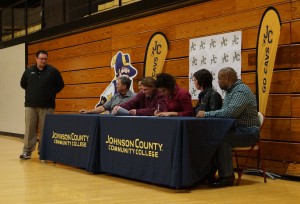
Two members of the college’s track team signed contracts with Division I schools Feb. 6. Hayes Grissom will be attending Troy University and Monet Jackson will be throwing for Colorado State.
Grissom, who throws javelin at the college, said it feels really good to have made a decision and to be done with the difficult and sometimes stressful selection process.
“I was reminding myself that I was blessed to be in such a situation where I am getting recruited,” Grissom.
Track and field Coach Phil Groves introduced the two during the signing, complimenting them for their hard work and dedication.
“Both these young people have really exemplified what it means to be a Cavalier,” Groves said. “They’re fantastic athletes, they’re outstanding students and they’re better people.”
Contact Stephen Cook, copy editor, at scook35@jccc.edu.